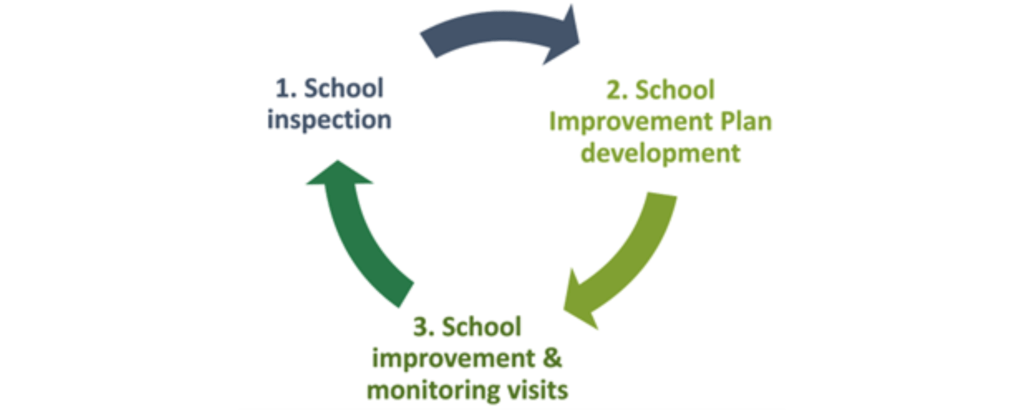Series: 190,000 young people learning more in stronger systems
Since 2019, PEAS has been working in partnership with the Uganda Directorate of Education Standards to improve leadership and management in secondary schools, now reaching 200 schools across the country.
We believe all students deserve a quality education, not just students at PEAS schools. Our partnership with the Directorate of Education Standards (DES) aims to deliver that. We know from 15 years of running quality school networks, that inspections can help leaders drive improvement if they come with formative feedback and follow up support. DES identified these as key gaps in their current approach, so we designed a programme with them to bring together the governments’ inspection framework and PEAS approach to follow-up support.

For this programme to support government-led national change, we know we need evidence of what’s working. In 2021, we commissioned the National Foundation for Educational Research (NFER) to act as the Learning Partner for the Inspect and Improve programme. Here we take a look at some of the key findings from the NFER report, which brings together evidence from a mixed-methods study from April 2021 to October 2022.
Stronger school leadership can drive positive change across schools
After a year of participating in the programme, 88% of school leaders reported a positive change in school leadership as a result of I&I. Improvements were observed by at least 70% of leaders across all other school areas such as teaching quality, teacher and student attendance and student safety.
These findings suggest other improvements across the school have emerged as a result of the programme’s targeted management support. Improvements were also seen in the frequency of meetings with Boards of Governors, and in leaders’ reported authority to make decisions on hiring staff, admissions, budget and the curriculum. The findings also showed that gender equity in the school workforce has the potential to attract greater enrolment of girls in school.
Schools are developing safer learning spaces and better supporting girls
During interviews, teachers reported a reduction in corporal punishment in schools. It was also observed that gender-sensitive teaching was having a positive impact on girls’ enrolment, attendance, and confidence – such as taking on more leadership roles in class and participating more in extracurricular activities. In addition, all teachers and school leaders in the interviews observed teachers delivering more class discussions, group work, and project-based activities.
One school leader at an Inspect & Improve school said: “There are some good inspiring messages on WhatsApp which when you see the videos you find that you can now apply it. For example, the punishments we give to the students, we used to cane but ever since PEAS came in, it reduced completely.”
A focus on student wellbeing, School Improvement Plans and community engagement helped schools to reopen after long school closures
The Inspect & Improve programme prepared schools during closures to provide psychological support and counselling to students. This provision was perceived by all three stakeholder groups to be vital in the wake of Covid-19 school closures and was seen to be key in improving student wellbeing. One participant said: “On Zoom, we had training, they were preparing us how to re-open during this time of Covid-19 and psychosocial support. By the time we opened, we were prepared compared to other schools …. For us, we were prepared for whatever happened.”
Project staff also cited having a functional School Improvement Plan as a key preparedness strategy that enabled them to mitigate the impact of disruptions. One school leader recognised that the I&I emphasis on involving governing bodies, parents and community in the school was instrumental to help with the challenges of COVID-19.
Digital tools are driving efficiencies and increasing collaboration
Recent evidence shows that the digitised inspection tool PEAS developed with DES enables users to generate inspection reports “promptly and efficiently”. The average time it takes to compile and submit a report has been significantly reduced – from 60 days to just one or two. This is an estimated reduction of 97%. The digitised inspection tool is also improving the accuracy of inspectors’ scores and helping them follow MoES’ guidelines more closely.
NFER found that school leaders’ communication with DES inspectors and PEAS staff has strengthened since Inspect and Improve launched. Setting up WhatsApp groups also made it easier to share best practices such as strategies to promote student welfare, safeguarding, and remedial learning.
PEAS and DES’ collaborative approach to designing and implementing the Inspect & Improve programme is critical for long-term change
The recent study supported pilot findings that the strong coordination and collaboration between PEAS and DES was a key strength, and critical for scale. According to key project stakeholders, the launch of the digital tools and the focus on cross-cutting themes of gender equality and safeguarding provided opportunities for further systems-level cooperation. This phase of the programme expanded formal opportunities for further coordination with DES and other departments across the Ministry of Education structure. These included collaborating with the Gender Unit, Secondary Education Department and the others across the Uganda MoES. These have offered opportunities for knowledge sharing and identification of potential partners for further scale up.
If you’re interested in finding out more about our systems strengthening work, please contact info@peas.org.uk. If you would like to support our work, please contact partnerships@peas.org.uk.